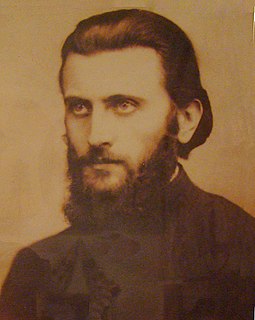A Quote by Arsenie Boca
God’s love for the biggest sinner is greater than the love of the holiest man for God
Related Quotes
By His gracious condescension God became man and is called man for the sake of man and by exchanging His condition for ours revealed the power that elevates man to God through his love for God and brings God down to man because of His love for man. By this blessed inversion, man is made God by divinization and God is made man by hominization. For the Word of God and God wills always and in all things to accomplish the mystery of His embodiment.
The cliché, God hates the sin but love the sinner, is false on the face of it and should be abandoned. Fourteen times in the first fifty Psalms alone, we are told that God hates the sinner, His wrath is on the liar, and so forth. In the Bible, the wrath of God rests both on the sin (Romans 1:18ff) and on the sinner (John 3:36).
Man depends on God for all things: God depends on man for one. Without man's love God does not exist as God, only as creator, and love is the one thing no one, not even God himself, can command. It is a free gift or it is nothing. And it is most itself, most free, when it is offered in spite of suffering, of injustice, and of death . . . The justification of the injustice of the universe is not our blind acceptance of God's inexplicable will, nor our trust in God's love, his dark and incomprehensible love, for us, but our human love, notwithstanding anything, for him.
To me there is nothing more sacred than love and laughter, and there is nothing more prayerful than playfulness. When you are in love, all fears disappear, and when you become love yourself, even death becomes irrelevant. Jesus is not very far away from the truth when he says, "God is love." Certainly God is power, the greatest power. I want to improve upon Jesus: I don't say God is love, I say love is God. To me God is only a symbol and love is a reality. God is only a myth - love is the experience of millions of people. God is only a word, but love can become a dance in your heart.
In the dominant Western religious system, the love of God is essentially the same as the belief in God, in God’s existence, God’s justice, God’s love. The love of God is essentially a thought experience. In the Eastern religions and in mysticism, the love of God is an intense feeling experience of oneness, inseparably linked with the expression of this love in every act of living.
Jesus wanted to show us his heart as the heart that loved so deeply. For this reason we have this commemoration today, especially of God's love. God loved us, he loved us with such great love. I am thinking of what St Ignatius told us.... He pointed out two criteria on love. The first: love is expressed more clearly in actions than in words. The second: there is greater love in giving than in receiving.
We must make a great difference between God's Word and the word of man. A man's word is a little sound, that flies into the air, and soon vanishes; but the Word of God is greater than heaven and earth, yea, greater than death and hell, for it forms part of the power of God, and endures everlastingly.
If you are penitent, you love. And if you love you are of God. All things are atoned for, all things are saved by love. If I, a sinner even as you are, am tender with you and have pity on you, how much more will God have pity upon you. Love is such a priceless treasure that you can redeem the whole world by it, and cleanse not only your own sins but the sins of others.
Feuerbach ... recognizes ... "even love, in itself the truest, most inward sentiment, becomes an obscure, illusory one through religiousness, since religious love loves man only for God's sake, therefore loves man only apparently, but in truth God only." Is this different with moral love? Does it love the man, this man for this man's sake, or for morality's sake, for Man's sake, and so-for homo homini Deus-for God's sake?
The gospel is the proclamation of free love; the revelation of the boundless charity of God. Nothing less than this will suit our world; nothing else is so likely to touch the heart, to go down to the lowest depths of depraved humanity, as the assurance that the sinner has been loved -- loved by God, loved with a righteous love, loved with a free love that makes no bargain as to merit, or fitness, or goodness.






























